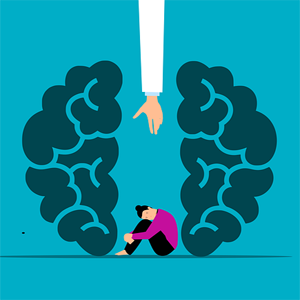Influence of rehabilitation on mental state in patients with lumbar intervertebral disc damage

Accepted: 25 June 2022
HTML: 7
All claims expressed in this article are solely those of the authors and do not necessarily represent those of their affiliated organizations, or those of the publisher, the editors and the reviewers. Any product that may be evaluated in this article or claim that may be made by its manufacturer is not guaranteed or endorsed by the publisher.
The present study aims to investigate the mental state changes in patients with lumbar intervertebral disc damage after rehabilitation program using a self-administered questionnaire IRES-3. The study was conducted in the Specialized Hospitals for Rehabilitation – National Complex EAD, branches Hissar and Banite, Bulgaria. It included 124 patients – 34 men and 90 women, aged from 35 to 85 years. The questionnaire IRES-3, validated by the authors for the Bulgarian population, was used for measurement of the subjective evaluation of the rehabilitation effect. Measurements were performed at the beginning, end and three months after rehabilitation (RH). The subjective evaluation of the patients’ mental state included the following scales: depression, fear, exhaustion of vitality, self-confidence and symptom: cognitive functioning. We found a statistically significant improvement of the scores three months after rehabilitation compared to the beginning of rehabilitation for all scales. The only exceptions are the scales exhaustion of vitality and symptom: cognitive functioning. We found a statistically significant improvement of the self-rated mental state after performed rehabilitation in patients with chronic diseases.
Doherty AM., Gaughran F. The interface of physical and mental health. Soc Psychiatry Psychiatr Epidemiol 2014; 49, 673–682. DOI: https://doi.org/10.1007/s00127-014-0847-7
Karapolat H. Important Points in Taking Care of Elderly Patients with Chronic Diseases. Turk J Phys Med Rehab 2009; 55: 88-9.
Härter M, Baumeister H, Bengel J. Psychische Störungen bei körperlichen Erkrankungen [Mental disorders in physical illnesses]. Springer Medizin; 2007; p.66. German. DOI: https://doi.org/10.1007/978-3-540-28450-5
Pevele R, Carson A, Rodin G. Depression in medical populations. BMJ 2002;325:149 DOI: https://doi.org/10.1136/bmj.325.7356.149
Sander et al. BMC Psychiatry 2017; 17:36 DOI: https://doi.org/10.1186/s12888-017-1193-6
Turner J, Kelly B. Emotional dimensions of chronic disease. West J Med. 2000;172(2):124-128. DOI: https://doi.org/10.1136/ewjm.172.2.124
Oral A, Ilieva E. Physiatric approaches to pain management in osteoarthritis: a review of the evidence of effectiveness. Pain Manag 2011;1:451–71. DOI: https://doi.org/10.2217/pmt.11.46
Härter M, Woll S, Reuter K, Wunsch A, Bengel J. Recognition of psychiatric disorders in musculoskeletal and cardiovascular rehabilitation patients. Arch Phys Med Rehabil. 2004 Jul;85(7):1192-7. DOI: https://doi.org/10.1016/j.apmr.2003.08.106
Gerdes N, Jäckel WH. "Indikatoren des Reha-Status (IRES)"--Ein Patientenfragebogen zur Beurteilung von Rehabilitationsbedürftigkeit und -erfolg ["Indicators of Reha-Status (IRES)"-a patient questionnaire for assessing need and success of rehabilitation]. Rehabilitation (Stuttg). 1992 May;31(2):73-9. German.
Ware JE Jr, Sherbourne CD. The MOS 36-item short-form health survey (SF-36). I. Conceptual framework and item selection. Med Care. 1992 Jun;30(6):473-83. German. DOI: https://doi.org/10.1097/00005650-199206000-00002
Sommer G, Fydrich T. Entwicklung und Überprüfung eines Fragebogens (F-sozU) [Development and review of a questionnaire (F-sozU)]. Diagnostica 1991;37:160–78. German.
Zigmond A, Snaith R. The hospital anxiety and depression scale. Acta Psychiatr Scand 1983;67:361–70. DOI: https://doi.org/10.1111/j.1600-0447.1983.tb09716.x
Bakova D, Mateva N. Reliability and Cross-cultural Validity of the Bulgarian Version of IRES-3. Folia Med. 2011;53:51–6. DOI: https://doi.org/10.2478/v10153-010-0037-7
Bührlen B, Gerdes N, Jäckel WH. Entwicklung und psychometrische Testung eines Patientenfragebogens für die medizinische Rehabilitation (IRES-3) [Development and psychometric testing of a patient questionnaire for medical rehabilitation (IRES-3)]. Rehabilitation (Stuttg) 2005;44:63–74. German. DOI: https://doi.org/10.1055/s-2004-834687
Nübling R, Schmidt J WW. Langfristige Ergebnisse Psychosomatischer Rehabilitation [Long-term outcomes of psychosomatic rehabilitation]. Psychother Psychosom med Psychol. 1999;49:343–53. German.
Çağlar N, Walden G, Esenyel M, Esenyel CZ, Tetik S, Emel E. Chronic Musculoskeletal Pain: Pain Related Disability and Psychological Distress. Turkish J Phys Med Rehab 2004;50.
Härter M. Ätiologie psychischer Störungen bei chronischen körperlichen Erkrankungen [Etiology of mental disorders in chronic physical illness]. Rehabilitation (Stuttg). 2002 ;357–66. German. DOI: https://doi.org/10.1055/s-2002-36278
Keck ME, Ropohl A, Rufer M, Hemmeter UM, Bondolfi G, Preisig M, Rennhard S, Hatzinger M, Holsboer-Trachsler E, Hättenschwiler J, Seifritz E. Die Behandlung der Angsterkrankungen. Teil 1: Panikstörung, Agoraphobie, generalisierte Angststörung, soziale Phobie, spezifische Phobien [The treatment of anxiety disorders. Part 1: Panic Disorder, Agoraphobia, Generalized Anxiety Disorder, Social Phobia, Specific Phobias]. Swiss Medical Forum 2011; 11:558-566. German. DOI: https://doi.org/10.4414/smf.2011.07588
Nübling R, Muthny FA, Bengel J, Kriz D, Herwig J, Hafen K. Die Bedeutung von Reha - Motivation und Behandlungserwartung für die Praxis der medizinischen Rehabilitation [The importance of rehabilitation motivation and treatment expectation for the practice of medical rehabilitation]. Rehabilitation motivation and treatment expectations. Book, Publisher: Huber, 2006; 15-23. German.
Nübling R, Löschmann C, Steffanowski A, Wittmann WW. Effektivität und Effizienz der stationären Behandlung psychisch Kranker : Vergleich zwischen den Versorgungssektoren Rehabilitation und Akutpsychosomatik [Effectiveness and efficiency of inpatient treatment of the mentally ill: comparison between the rehabilitation and acute psychosomatic care sectors]. Deutsche Rentenversicherung / DRV-Schriften. Publisher: Buschmann-Steinhage, Rolf 2005;(59):472-476. German.
Copyright (c) 2022 The Authors

This work is licensed under a Creative Commons Attribution-NonCommercial 4.0 International License.
PAGEPress has chosen to apply the Creative Commons Attribution NonCommercial 4.0 International License (CC BY-NC 4.0) to all manuscripts to be published.


 https://doi.org/10.4081/ejtm.2022.10666
https://doi.org/10.4081/ejtm.2022.10666



